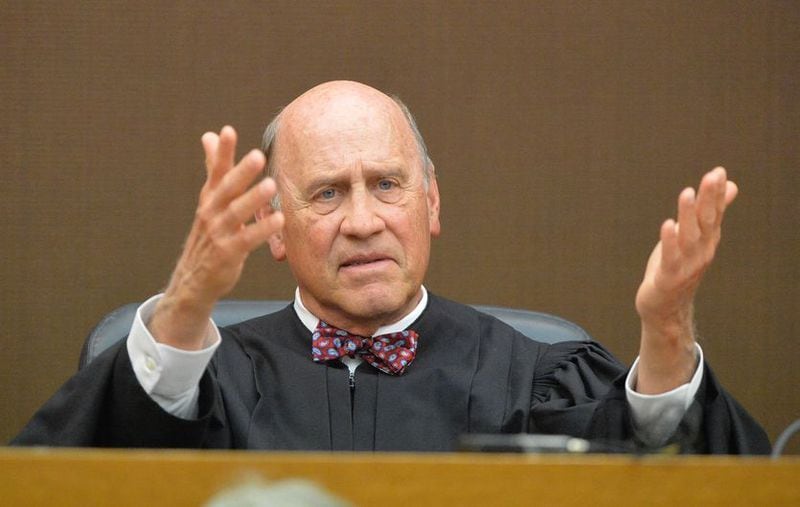“Adios.”
That was the final word a few minutes ago from Fulton County Superior Court Judge Jerry Baxter after reducing the prison sentences of three APS defendants from seven years to serve to three.
Credit: Maureen Downey
Credit: Maureen Downey
Baxter opened the short court proceeding by saying, “I have done a lot of reflection on the sentence that I rendered two weeks ago. I am not comfortable with it. When a judge goes home and he keeps thinking over and over that something’s wrong, something is usually wrong. Anyway, I want to modify the sentence so I can live with it. I am going to put myself out to pasture in the not too distant future and I want to be out to pasture without any regrets.”
He urged convicted educators Tamara Cotman, Sharon Davis-Williams and Michael Pitts to begin their community service now, noting their appeals -- which he predicted would not prevail -- could take two years.
In the meantime, Baxter said the talented trio could help the community. “These are smart people. They have something to offer,” he said.
It was apparent Baxter reflected on the contention of many educators after the original sentencing that he overstated the impact of test tamping on the fates of children while ignoring the effects of poverty.
At the original sentencing, an exasperated and angry Baxter dubbed the cheating scandal the “sickest thing that's ever happened to this town" and said it pushed kids on a path to crime. "They are the most vulnerable children in our city, and they were shortchanged. They were passed on, and now they're in the prison system,” he said.
Today, the judge went deeper, closing with a statement about the poverty and the hopelessness of the neighborhoods where cheating occurred.
Acknowledging the “fine” teachers in many APS schools serving the poorest of children, Baxter said, “But that alone is not going to solve the problem. Hopefully, after going through this, our community will put a microscope on it and hopefully make things better for these children who didn’t ask to be born in these conditions, but they are born in these conditions and need to get all the help they can to get out of there.”
I wrote about the same issue in the print AJC after the first round of sentencing:
To be clear, the altering of student exams to make schools appear more successful was inexcusable, and the educators deserve to be punished. But students in those high-poverty Atlanta schools didn't falter academically because teachers changed answers on the CRCT. Teachers changed answers on the CRCT because students were faltering.
I worry that attributing poor student performance to test tampering promotes a simplistic remedy: Make it harder for educators to cheat and punish them severely when they do. It does not address the core issue of how to advance children who arrive at school far behind advantaged peers whose parents have already invested immense resources into developing their 5-year-old's critical thinking and problem-solving abilities.
Cheating was so rampant at Parks Middle School that Atlanta has blotted out the name. After merging with another school in the old Parks building, the school was re-branded Sylvan Hills Middle. But APS has yet to vanquish the low academic performance.
On last year's state report card, which grades Georgia schools on a 100-point scale, Sylvan Middle scored 52.7 --- below the average APS middle school grade of 65.8 and the average state grade of 73.8.
In the five years after the state's audit confirmed the AJC findings of cheating, testing protocols have tightened in Atlanta, and dozens of educators who confessed to cheating have been ousted from the classroom. But that hasn't brought an end to academic challenges in the district. Twenty-eight Atlanta schools --- more than in any other Georgia district --- qualify for state takeover due to low performance.
Schools with high numbers of poor children face enormous hurdles catching their students up to middle-class peers; these schools often have to compensate for the collapse of multiple supports in children's lives, from family, to personal safety, to adequate housing, to health care.
We've expected teachers and schools to shore up these fallen structures alone. And we've been telling poor kids, "Work harder and you will overcome these obstacles and succeed."
Yes, some kids somehow find the resiliency and grit to reach the top despite the boulders in their path. However, they are rare, as are high school runners with a 4-minute mile or valedictorians with perfect SAT and ACT scores. While we can admire these preternatural talents, we shouldn't pretend they are the exemplars. They are the exceptions.
Today, the achievement gap between high- and low-income students is 40 percent wider than a generation ago, mostly because wealthier parents are investing a lot more time, money and energy into their children's cognitive development. They understand the future belongs to not just the educated, but the highly educated.
Many skeptics argue social programs and wraparound services can't replace attentive and dedicated parenting. I agree and wish young women and men would not have babies when they are 17. And if they do, I wish they would provide secure homes for their babies and complete their own education so they can lift themselves and their children out of poverty.
But if they do none of those things, our default position can no longer be that schools can fix it all.
About the Author







